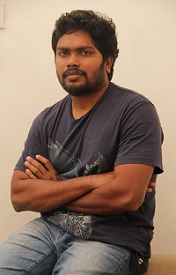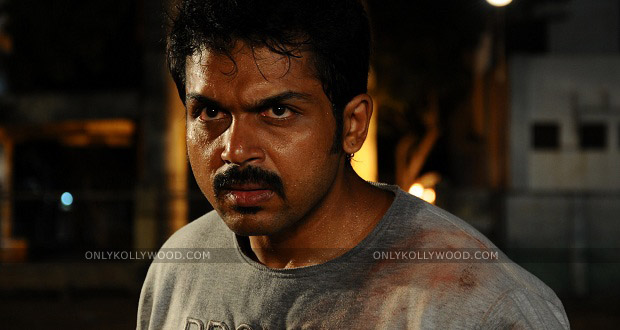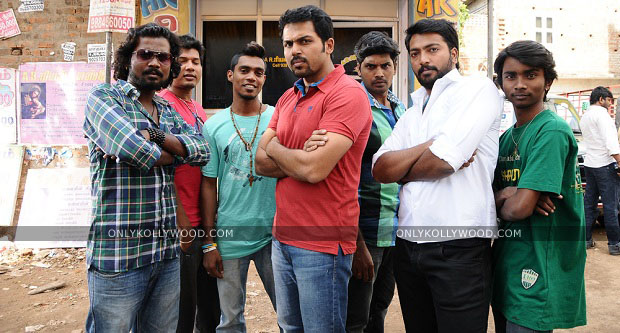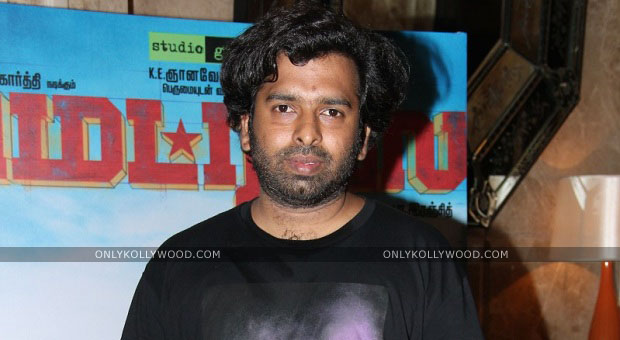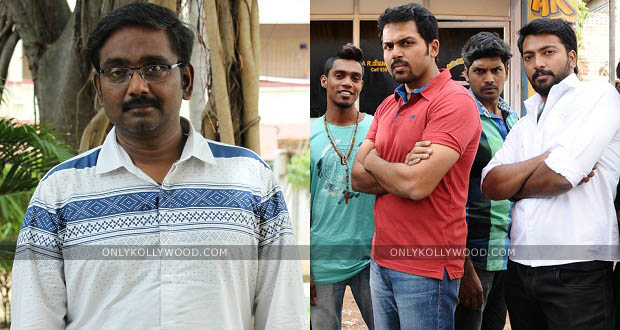Interview with Pa. Ranjith, the director of Madras
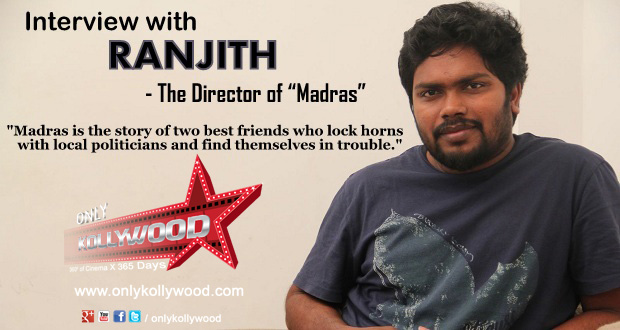
‘Madras’ could easily be described as the story of a wall. Director Ranjith says with child-like excitement that audiences will find the wall as an important character in his film, which is releasing in cinemas on Friday. In this freewheeling chat, he shares with Only Kollywood the journey of his film from an idea to a finished product.
Ranjith’s inspiration for his story came from his experience as an artist. “I’m a student of college of fine arts. I’ve worked for a while as a signboard artist and have painted for several local brands on walls. I’ve seen people fight over a wall. Sometimes a small misunderstanding had aggravated into a bigger issue,” said Ranjith.
“Off late, this problem has been on the rise in Chennai. I felt this would be an interesting story to narrate on screen. That was merely a small idea inspired from real life and I sat down and developed it into a script,” he said.
The Wall
But how could a wall possibly be portrayed as a character? “Some people in the film fear the wall, while others are protected by it. All this automatically makes it a character of high importance,” he said.
Ranjith says that they’ve taken special care to portray the wall in such a way that you’re convinced it’s a character. “Just like how you showcase a person in different shots such as close-up and wide angle, the wall too is featured in a similar fashion,” he added. 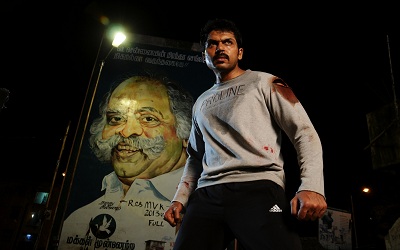
“Based on different scenes, we’ve depicted the wall differently. The wall you see in the fight sequence is showcased differently in a love montage. The shots for the wall were designed keeping in mind different moods in the story,” Ranjith said, and added: “We’ve taken a lot of effort to portray the wall as a character”.
Bringing North Madras alive
After he got his script ready, Ranjith decided to shoot the film as realistically as possible. He chose north Madras as his backdrop and zeroed in on a few places like Vysarpadi.
“The film captures the lifestyle of people living in north Madras. It’s the story of two best friends who lock horns with local politicians and find themselves in trouble. The core subject of the film is about wall promotions,” said Ranjith.
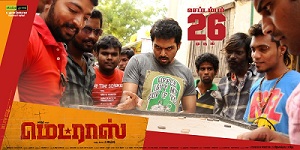 The story focuses on the life of a few families in a housing board. “Even the smallest of a problem can cause havoc in the lives of middle class people. When two parties fight for a wall, its impact is felt by people who have nothing to do with the issue”.
The story focuses on the life of a few families in a housing board. “Even the smallest of a problem can cause havoc in the lives of middle class people. When two parties fight for a wall, its impact is felt by people who have nothing to do with the issue”.
Ranjith said he never went and stayed in north Madras to study the lifestyle of its people. “I realized there isn’t much difference between us and the people there. All of us have aspirations in life, we talk alike and enjoy the same thing together,” he said. “I did meet a lot of people there to design my characters and portray the flavour of the place on screen. I managed to successfully portray certain things like the accent of these people, their dressing style and favorite pastime activity on screen,” he added.
Ranjith says “Madras” will give audiences a slice-of-life experience of living in north Madras. “The biggest challenge was to keep everything realistic.
Keeping it real
I wanted the film to be very close to reality because I felt when audiences watch it; they should feel they’re watching their own story”.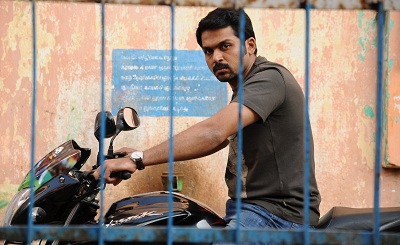
How did he achieve to make his film realistic? “Usually when you shoot a scene for a film, the focus is on the actors in the frame. The focus is usually on the foreground. Nobody cares to portray what happens in the background while a scene is taking place in foreground”.
“By striking a parallel between the foreground and background, we’ve portrayed the film very realistically,” he added.
Karthi – KAALI
“Madras” is a very important film for Karthi, who is desperate for a hit. When quizzed Ranjith if he felt any pressure in directing a star, he said: “When Karthi sir came on board, I decided I wouldn’t see him as a star as I felt it would have a strong impact on the film at different levels. We all saw him as the character Kaali he plays in the film”.
 “Karthi also ensured that he was only seen as a character and co-star on sets. He tried to behave like a newcomer working in his first film. I never found any air of stardom around him and he was willing to work until he was asked to stop,” Ranjith said.
“Karthi also ensured that he was only seen as a character and co-star on sets. He tried to behave like a newcomer working in his first film. I never found any air of stardom around him and he was willing to work until he was asked to stop,” Ranjith said.
The shoot of “Madras” was inundated with a lot of people throughout the shoot. Ranjith said Karthi always tried to be one among them and never let his star side take over. “Karthi worked with so much of dedication. He would sit an entire day on sets if it require. Unlike other stars, he wouldn’t go sit in his caravan after a shot,” he said.
A spate of newcomers & theater artists
Besides Karthi, “Madras” features a host of newcomers. Ranjith chose to work with new faces because “he always likes to be comfortable with his actors”.
“If I cast popular actors, there might be call sheet problems and maybe some other issue too. Moreover, I always give high priority to casting because I feel it’s very important. Since the story is about the life in a housing board, I wanted to cast people who could be instantly accepted as though they belong there,” he said. Ranjith feels if he cast right actors for a film then “half of your job as a director is complete. The other half is how you make use of them and the overall presentation”.
“Had I cast popular faces for this film, it would’ve taken audiences time to accept them in a certain role,” he added. But Ranjith didn’t cast actors with no experience. “All my actors are great theatre artists. They’ve been part of modern plays, street dramas and are natural performers. When audiences will see them on screen none would realize that they’re mostly first-time actors,” he said.
The give-it-all mantra
“Madras” comes after the stupendous success of Ranjith’s “Attakathi”. Any other director would’ve cashed in on the success of the first film and made a few films just to prove. But Ranjith didn’t do the same mistake.
“Even if I do a film or not it really doesn’t bother anyone. Nobody is concerned why haven’t made a new film yet. I usually don’t make films 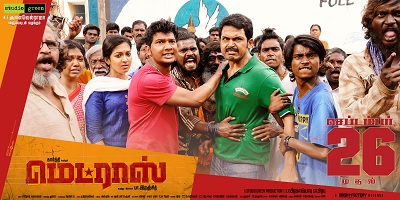 in a hurry. What matters to me the most is whether a film is coming out well or not,” he said.
in a hurry. What matters to me the most is whether a film is coming out well or not,” he said.
“When I do a film, I give it my all to ensure it turns out to be great. And for that to happen, I don’t mind waiting. I spent a lot of time writing the script of ‘Madras’, but I didn’t have any regrets that my film is coming two years after my debut,” he added.
Night-life in North Madras
“Madras” is one of the few Tamil films to have been predominantly shot at night. Ranjith said more than half of the film was shot at night.
“Chennai doesn’t really rest through the night. While some places do become quiet around 10 pm, but usually life comes alive after 11 pm here, especially in north Madras, where People play football under floodlights, do so many other things at night,” he said.
“Since it’s a realistic story, we didn’t want to change anything and ensured we shot mostly at night. I’m sure it will be a different experience for the audiences,” he added.
Ranjith’s biggest learning from “Madras” is that “we should make the film we set out to write”.


